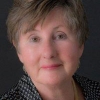Elisabeth Holdsworth

Elisabeth Holdsworth won the inaugural Calibre Essay Prize in 2007 for her essay ‘An Die Nachgeborenen: For Those Who Come After’. She was born in the Netherlands and migrated to Australia with her parents in 1959. Educated in Melbourne, she had a long career in the Department of Defence. Her most recent novel is Those Who Come After (Picador, 2011). Her ABR Raft Fellowship essay ‘If This Is a Jew’ was published in November 2017.
On 4 October 1918, one month before he was killed, Wilfred Owen wrote to his mother describing the ‘mop-up’ operations in which his division was engaged. ‘It passed the limits of my Abhorrence. I lost all my earthly faculties and fought like an angel.’ Owen assured his beloved mother that his nerves were ‘in perfect order’. This letter, written by the poet who gave us ‘Anthem for Doo ... (read more)
In The Netherlands, freedom of speech is enshrined in Article 23 of the Constitution, a document written in blood, firstly in the fight against the Spanish in the sixteenth century, then amongst ourselves – Calvinist against Catholic. Radical Calvinism created the welfare state and made possible euthanasia, same-sex marriages and a slew of rights not available in other countries.
Theo van Gogh, ... (read more)
Too many specific years in the twentieth century were said to be ‘pivotal’, but 1968 was clearly a standout. In the United States, Martin Luther King and Bobby Kennedy were assassinated; there were student protests in Paris; and Russian tanks signalled the end of the ‘Prague Spring’. In January 1968, on the other side of the world, in an area once known as French Indochina, the army of the ... (read more)
Professors Ruth Balint and Julie Kalman are descended from Jews impacted by the Holocaust. No surprise then that in the introductory sentences of this work they remind us that the first people smuggler was probably Moses. Throughout the Jewish year, we study this colossus, who may or may not have existed, as he leads the Hebrews out of Pharaoh’s bondage into the desert toward a promised land. Fo ... (read more)
Westerbork is the name of a transit camp located in the Netherlands. You transitioned from Westerbork to your final destination by means of the Nationale Spoorwegen (the national railways). Eddy de Wind, a Dutch Jewish psychiatrist, met his future wife, Friedel, in Westerbork. Both were sent to Auschwitz in 1943. Eddy was sent to Block 9 as part of the medical staff, Friedel to Block 10 to work as ... (read more)
The foremost challenge of our time remains the passing of Jewish ethnicity, the idea that Jews are automatically joined at the hip by language, history and memory ... Without doubt that era is gone ... The age of ethnicity has become the age of fractured identity, where we struggle to decide what aspect of identity takes priority and when.
Rabbi Lawrence Hoffman1
For most of my life I ha ... (read more)
Towards the end of this handsome work, Mark Dapin makes the following observation: ‘There are many more holocaust memoirs written by Jews who emigrated from Europe to Australia than there are personal histories of Australian-born or raised Jewish soldiers. Everywhere in the world the Jewish story is focussed on persecution – the plight of refugees; the unspeakable horrors of the death camps ... (read more)
Valerie Murray, born Valika Morelli in Hungary during World War II and, for the past half century, wife of poet Les Murray, has written an enchanting memoir of her early life in Europe and Australia. The description ‘enchanting’ is used deliberately. The brothers Grimm and their terrifying tales are deployed throughout the work. The metaphor extends to the writing style – spaced paragraphs o ... (read more)
About ten years ago I was interviewed on Irish radio on a matter entirely unconnected with writing. The first question the interviewer asked me was, ‘Is that yourself, Elisabeth?’ This ungrammatical question struck me as both hilarious and pertinent. I don’t remember much about the interview except that leading question.
‘Is that yourself?’ In 1959 the sociologist Erving Goffman wrote a ... (read more)
